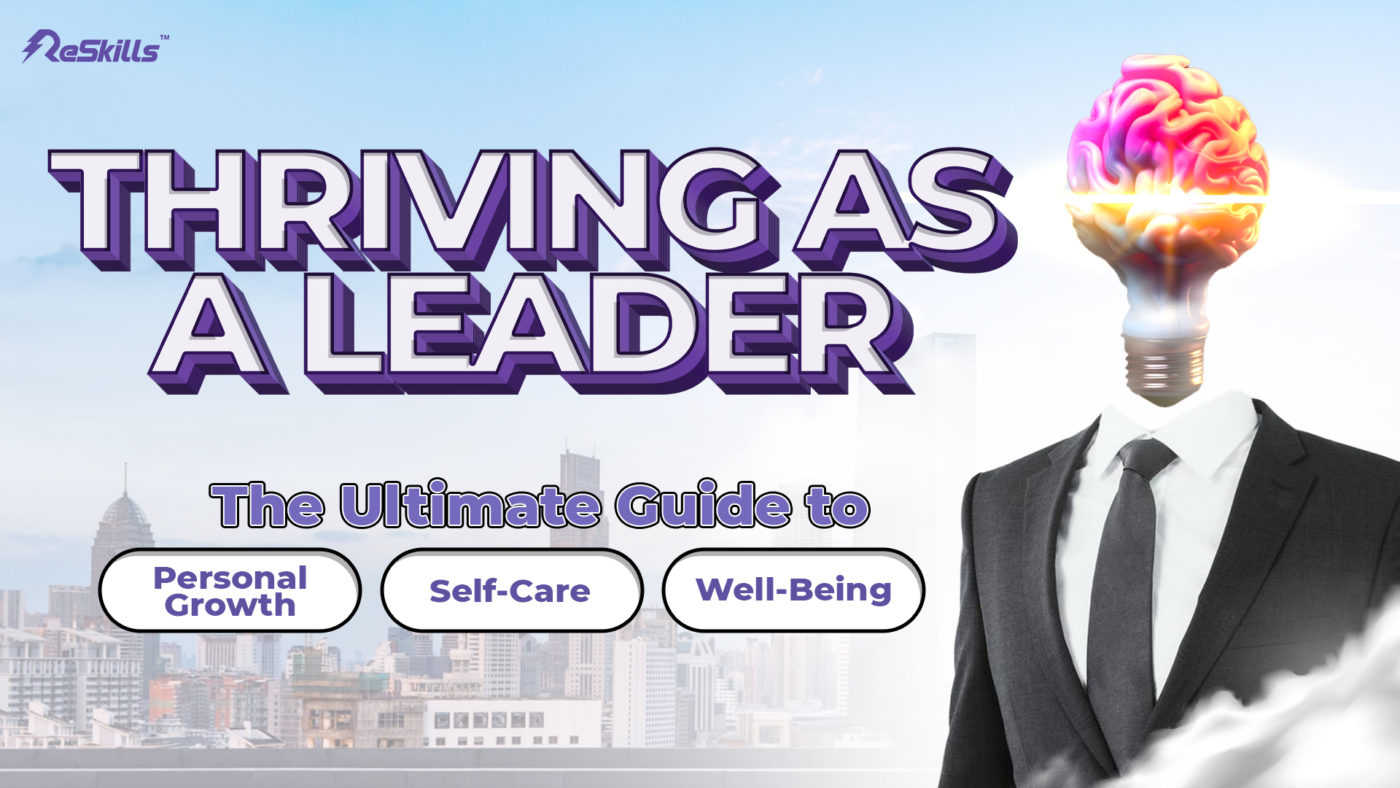Leadership is a demanding role that requires professional expertise, personal growth, self-care, and well-being. To be an effective leader, it is essential to prioritize your development and take care of your physical, mental, and emotional well-being. This article explores strategies and practices to help leaders cultivate personal growth, engage in self-care, and enhance their well-being.

Self-Reflection
Leadership growth starts with self-reflection. Self-reflection is a powerful tool for personal growth and self-awareness. It allows leaders to identify their strengths, weaknesses, values, and goals. Here are the examples of self-reflection practices for leaders:
- Journaling: Make a point of writing down your thoughts, experiences, and reflections daily. This practice can assist you in gaining insights into your leadership style, emotions, and obstacles, allowing you to make better judgements and find opportunities for progress.
- Feedback Seeking: Ask for feedback actively from your team, colleagues, or mentors. Inquire about your leadership effectiveness, communication style, and opportunities for improvement. Accepting feedback allows you to obtain new insights and improve your self-awareness as a leader.

Continuous Learning
Commit yourself to lifelong learning and personal development. Engaging in learning activities enhances your leadership abilities and keeps you motivated and adaptable in an ever-changing environment. Here are two examples of how leaders can engage in continuous learning:
- Reading and Research: Study books, articles, and research papers on leadership, management, and personal development. Investigate themes such as emotional intelligence, strategic thinking, and change management. Staying informed and broadening your knowledge base will help you consistently improve your leadership skills.
- Attending Workshops and Conferences: Actively look for chances to attend leadership- and personal-development-related workshops, conferences, or webinars. These gatherings offer access to subject matter experts, chances for networking, and up-to-date business information. Participating in such occasions exposes you to fresh viewpoints and ideas, expanding your leadership horizons.

Time Management
Effective time management is critical for leaders to avoid burnout and maintain a healthy work-life balance. To avoid overwhelming workloads, prioritise duties, delegate when possible, and set boundaries. You can obtain personal and professional fulfilment by managing your time correctly. The following are two examples of time management techniques for leaders:
- Prioritization and Delegation: Establish clear priorities and concentrate on high-value tasks that support your objectives and obligations. Give people the responsibility for things they can handle to free up your time for more important responsibilities. This strategy aids in better workload management and a balanced work-life schedule.
- Time Blocking: Utilise time management strategies to set aside time for particular chores, meetings, and self-care activities. Set aside time for concentrated work, teamwork, introspection, physical activity, and personal time. By actively planning your day, you can boost productivity and ensure that self-care activities are incorporated into your routine.

Emotional Intelligence
Develop self-awareness and emotional control to foster a helpful and upbeat work atmosphere. Strong connections, inspiring people, and resolving disagreements are all easier for leaders with high emotional intelligence to achieve. Developing emotional intelligence as a leader can be demonstrated in these two instances:
- Empathy and Active Listening: Put yourself in the shoes of others and try to understand their points of view and feelings. Create a secure and encouraging workplace by actively listening to your team members, colleagues, and stakeholders without passing judgement. Empathy and active listening help to build trust and develop relationships.
- Conflict Resolution Skills: Constructive communication, negotiation, and problem-solving are a few skills to learn and use while resolving conflicts. Acquire the skill of handling disputes amicably, rationally, and with respect for all parties. You may encourage successful outcomes and sustain a pleasant work atmosphere by handling conflicts with emotional intelligence.

Self-Care Rituals
Self-care is something that leaders frequently overlook, but it’s essential for preserving well-being and avoiding burnout. Make time for activities to restore your mental, physical, and emotional well-being. Here are two examples of leaders’ self-care practices:
- Regular Exercise and Movement: Go on a jog, practise yoga, or go swimming—do anything active that you enjoy. Schedule regular exercise to increase energy, lower stress, and enhance general health. Your resiliency as a leader is improved by exercise, as is your overall health and mental clarity.
- Mindfulness and Meditation: Develop a calm and concentrated mindset by engaging in mindfulness and meditation. Give yourself some time each day for some guided meditation or mindful breathing. These exercises improve decision-making skills, promote mental clarity, and lessen stress.
For leaders to succeed in their positions and create a lasting impression, it is crucial to prioritise personal development, self-care, and well-being. Leaders can improve their well-being while motivating people around them by practising self-reflection, ongoing learning, efficient time management, emotional intelligence, and self-care rituals. It’s crucial to maintain connections because the journey towards personal improvement is continual.
For more insightful information, inspiration, and advice to help you on your leadership path, follow us on our social media channels. Let’s work together to develop, care for ourselves, and make a difference as leaders. Sign up for our community now!



